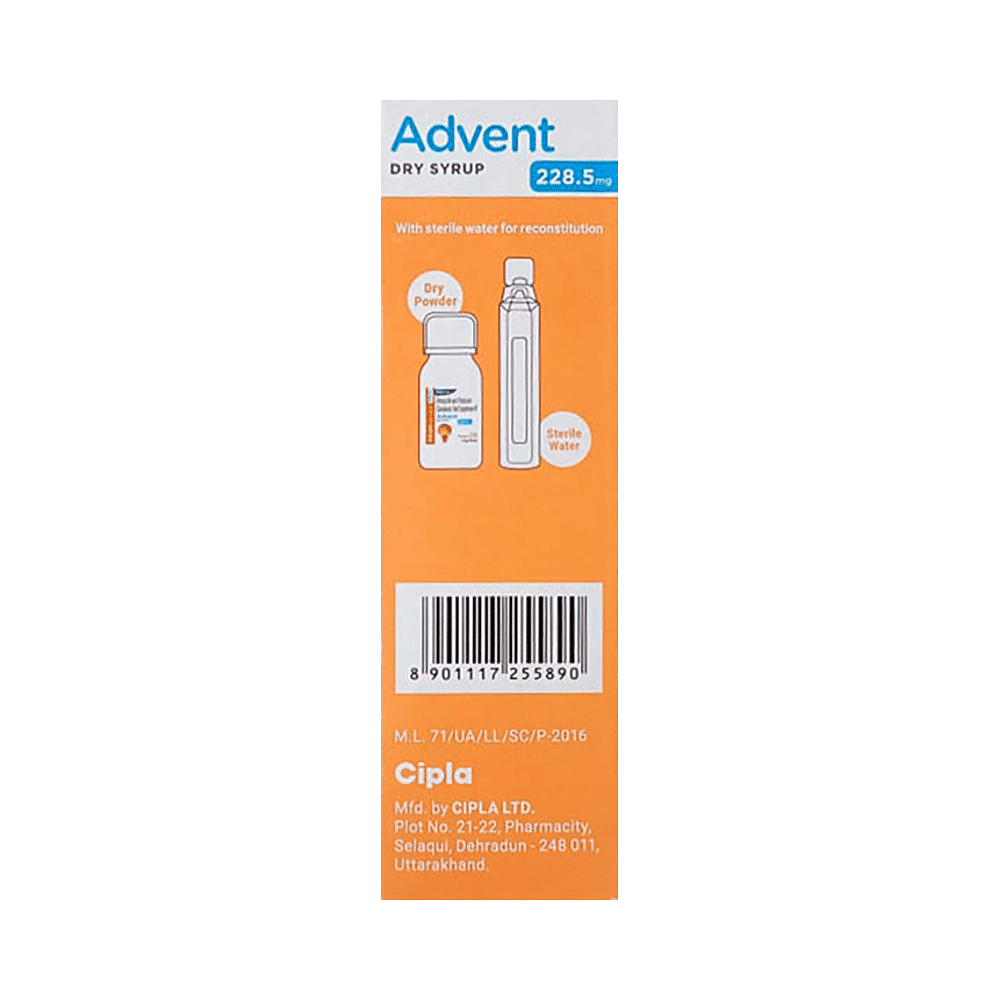
Valclav Dry Syrup
Manufacturer
Valentis Pharma
Salt Composition
Amoxycillin (200mg/5ml) + Clavulanic Acid (28.5mg/5ml)
Key Information
Short Description
Valclav Dry Syrup is an antibiotic medicine that helps treat bacterial infections of the ear, nose, throat, chest, lungs, teeth, skin, and urinary tract.
Dosage Form
Dry Syrup
Introduction
Valclav Dry Syrup is an antibiotic medicine that helps treat bacterial infections of the ear, nose, throat, chest, lungs, teeth, skin, and urinary tract. It is capable of killing bacteria that have become resistant to other therapies and thus also helps treat tuberculosis that is resistant to other treatments.
Directions for Use
Your child must complete the entire course of antibiotics. Stopping too soon may cause the bacteria to multiply again or cause another infection.
How it works
Valclav Dry Syrup is an antibiotic. It has two active agents amoxycillin and clavulanic acid. Amoxycillin works by preventing the formation of the bacterial protective covering (cell wall) essential for the survival of the bacteria. Whereas clavulanic acid serves a special purpose of inhibiting an enzyme (beta-lactamase) that is produced by resistant bacteria. This makes the combination of amoxycillin and clavulanic acid an effective line of treatment for many types of infections.
Quick Tips
Your child must complete the entire course of antibiotics. Stopping too soon may cause the bacteria to multiply again or cause another infection. Encourage your child to drink plenty of water in case diarrhea develops as a side effect. Never give Valclav Dry Syrup until and unless prescribed by the doctor. Do not give Valclav Dry Syrup to treat common cold and flu-like symptoms caused by viruses. Check ‘expiry’ before giving Valclav Dry Syrup to your child. Immediately discard all the expired medicines.
Related Medicines

Advent 228.5mg Dry Syrup Tangy Orange

Clanex Dry Syrup

Anclov Dry Syrup

Xyclav Dry Syrup

Auxgo Dry Syrup

Amoxyoj CV Dry Syrup

Elmoclav Dry Syrup

Stivmox CV Dry Syrup

Amboxy CV Dry Syrup

Kramox CV Dry Syrup
Frequently asked questions
Can other medicines be given at the same time as Valclav Dry Syrup?
Valclav Dry Syrup may interact with other medications or substances. It is crucial to inform your child's doctor about all other medications they are taking before starting Valclav Dry Syrup. Always consult with your child’s healthcare professional for medication guidance.
Can I get my child vaccinated while on treatment with Valclav Dry Syrup?
Most antibiotics do not interfere with the ingredients in vaccines or cause a bad reaction in children who have recently received them. However, it is best to avoid vaccinations until your child recovers from the illness. Once they feel better, the vaccine can be administered.
Which lab tests may my child undergo while taking Valclav Dry Syrup on a long-term basis?
If treatment is prolonged, your child's doctor might periodically monitor kidney and liver function to assess their condition.
Can I give a higher than the recommended dose of Valclav Dry Syrup to my child?
It's not safe to exceed the recommended dose of this medication. Higher doses may increase the risk of side effects. If your child experiences worsening symptoms, consult their doctor for re-evaluation.
Can I stop giving Valclav Dry Syrup to my child when the symptoms are relieved?
No, do not discontinue this medication unless it’s the final step in your child's treatment. Symptoms may improve before the infection is fully eradicated. Therefore, continue taking the medicine as prescribed by your doctor.
Can the use of Valclav Dry Syrup cause diarrhea?
Valclav Dry Syrup can sometimes cause diarrhea. This is due to its antibacterial properties and the potential disruption of good bacteria in the stomach. Encourage your child to drink plenty of water or other fluids if experiencing diarrhea. If symptoms persist or signs of dehydration like dark-colored, strong-smelling urine appear, consult a doctor before giving any additional medications.
Do all viral common colds result in secondary bacterial infection?
Most viral colds do not lead to bacterial infections. It is generally not necessary to use antibiotics for the treatment of viral infections, and using them can increase the risk of side effects. Consult your child's doctor before starting any medications.
The mucus coming out of my child’s nose is yellow-green. Is it a sign of a bacterial infection?
Yellow or green discharge in the nose during a common cold is normal and does not necessarily indicate a bacterial infection. During this phase, the mucus can thicken up and change color from clear to yellow or green. Symptoms typically last for 7-10 days.
Is there any sign which shows that my child needs immediate medical attention?
In case of severe allergic reactions (breathing problems, skin rashes), gastrointestinal infections (diarrhea), or liver damage (weakness, paleness, vomiting), contact your child's doctor immediately. Though rare, these side effects are serious and require expert assistance.


